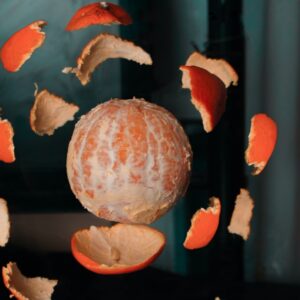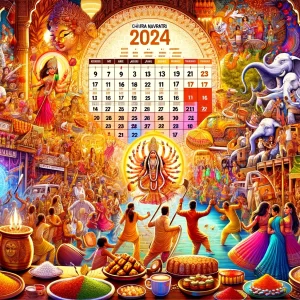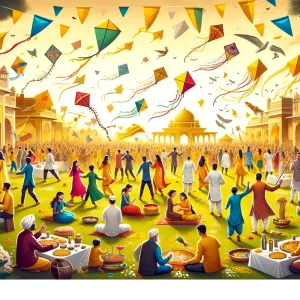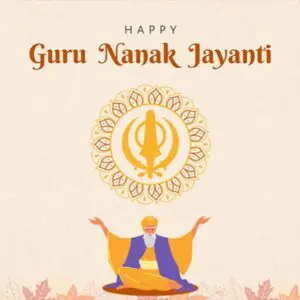Holi Like Festivals Around The World
Holi Like Festivals Around The World. Do you suppose, just Indians have a good time celebrations like Holi? Reconsider, on the grounds that it appears we have motivated numerous different nations to get filthy for the sake of merriments. Assuming you’ve at any point thought about how Holi appears to the rest of the world-insane Indians covering each other with variety and throwing containers of water around-then relax because of the way that we are not by any means the only ones with insane celebrations. There are numerous all over the planet that fall in a comparable class. Here are a portion of the celebrations like Holi from around the world.
Clean Monday Flour War Carnival, Greece
There’s nothing perfect about The Clean Monday celebration that is held in Galaxidi in Greece. Typically celebrated toward the beginning of March, this denotes the start of the 40-day Lent period. On this day, revelers paint their countenances and pelt fistfuls of hued flour at one another. Endlessly sacks of flour (about 1,500 kgs of it) are utilized; before the day’s over everybody looks they’ve experienced some massive flour factory. Precautionary measures are encouraged and taken, as you can envision goggles, covers and even hoods are worn to try not to get the powder in the mouth, nose and eyes.
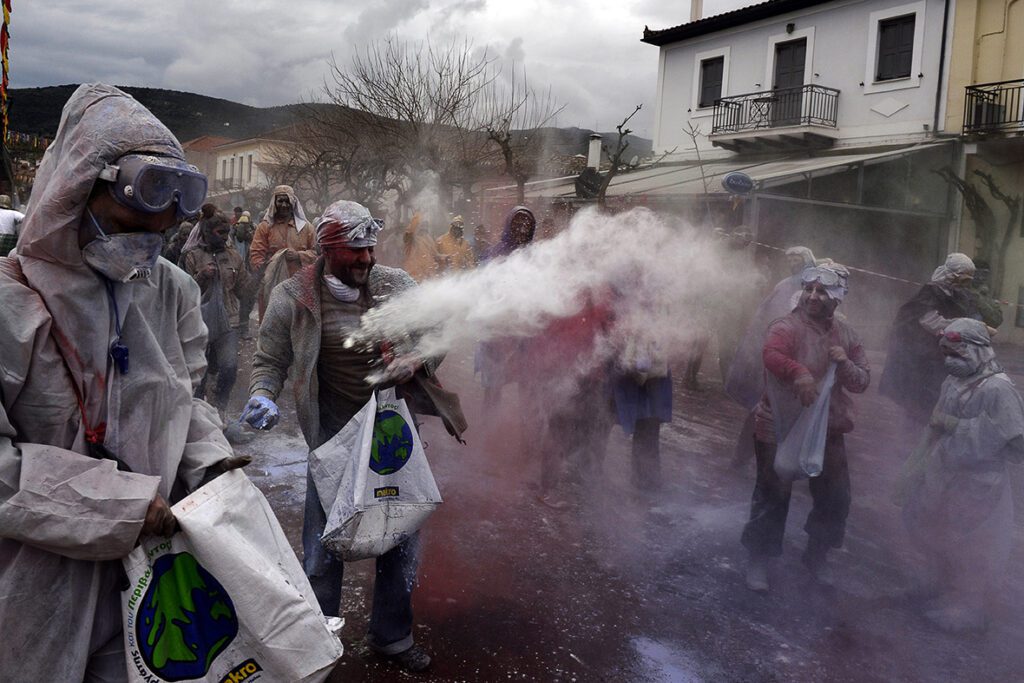
The Clean Monday Flour War has been celebrated for more than 200 years. Legend has it that the people of Galaxidi started this as a rebellion against the Ottoman rulers. Clean Monday is also called Ash Monday, so one theory is that the coloured flour could have signified ash.
Chinchilla Watermelon Festival in Australia
Chinchilla is a town in the Darling Downs region of Queensland, Australia which is also known as the ‘Melon Capital of Australia’. There is a Melon Festival every second year in February, where events like Melon Bulls eye, Melon Skiing, Melon Chariot, Melon Bungee, Melon Ironman, a pip spitting competition, and melon eating races take place. But the most exciting is Melon Head Smashing – cracking open as many watermelons as possible using only the head. – the next Watermelon Festival is to be held in 2015
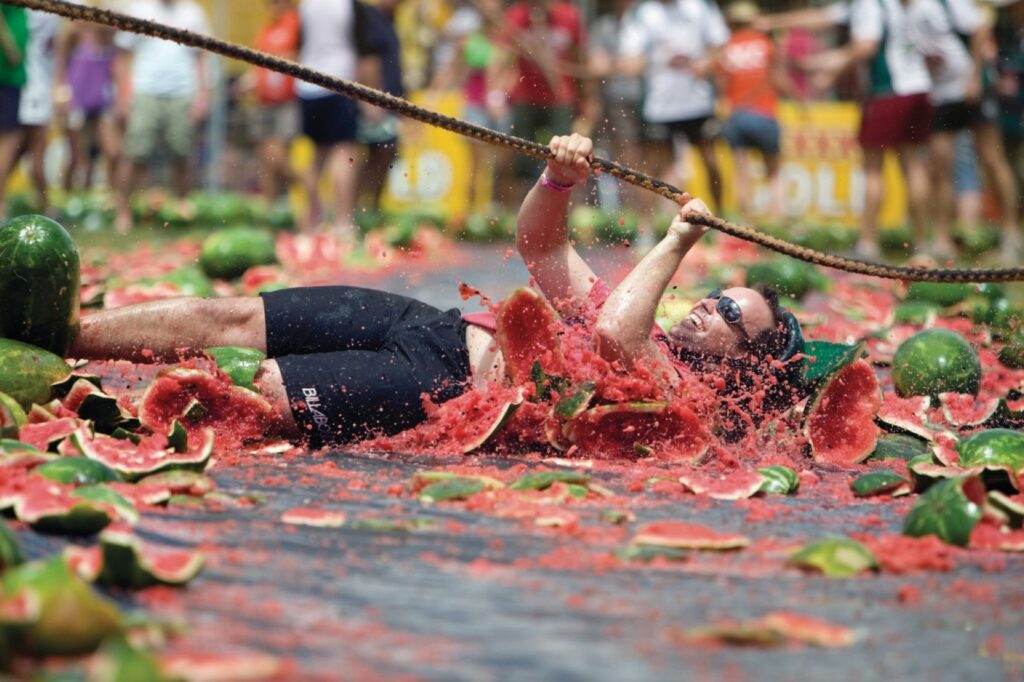
‘The Tomato Battle’ or ‘La Tomatina’ in Bunol, Spain
La Tomatina is a Spanish festival celebrated in the Valencian town of Buñol. Held on the last Wednesday of August, people throw tomatoes get into the tomato fight just for fun. La Tomatina tomato fight in Buñol near Valencia happens every year on the last Wednesday in August though the partying starts earlier in the week.
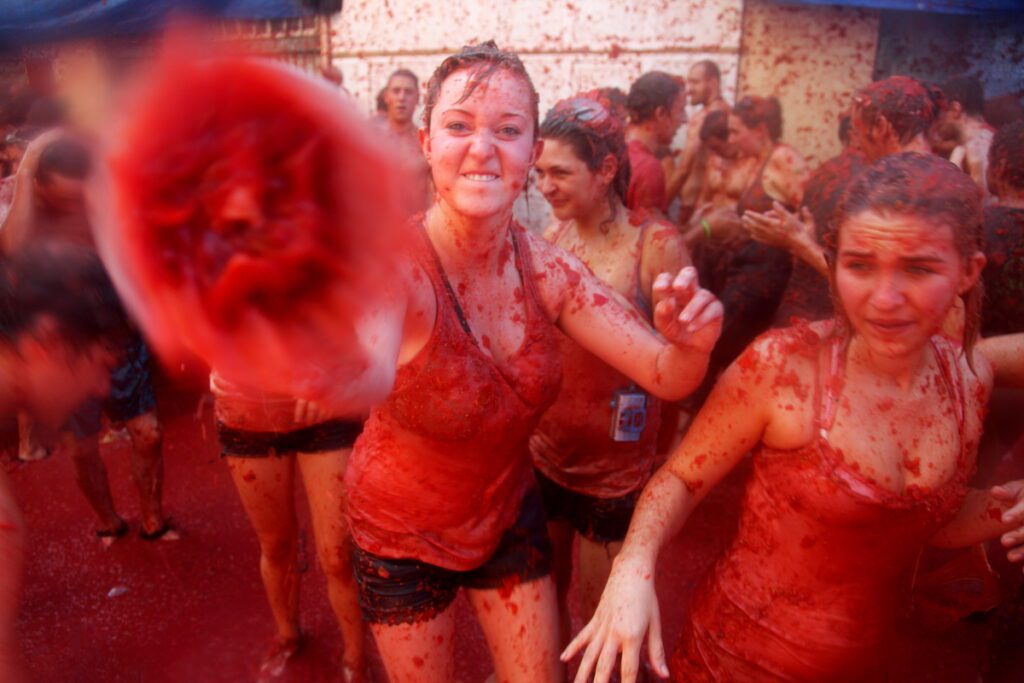
The highlight of the festival is the tomato fight which takes place between 11am and 1pm on that day. The event has become one of the highlights on Spain’s summer festivals calendar with thousands of people flocking to this little Valencian town for this chaotic event. Such are the numbers going to La Tomatina that the event has become a victim of its own success. The sheer number of people means that it’s extremely difficult to get anywhere near the central area where the tomato lorries arrive so you may well find yourself a few streets away from the main action. Never mind, there are plenty people in the same boat and the street partying goes on no matter where you are.
Mud Festival, South Korea
Holi in India, at times gets muddy, but in the Boryeong, a town around 200 km south of Seoul, South Korea, it’s all about mud, when they celebrate Mud Festival. It is an annual festival which takes place during the summer. The started in 1998 and, by 2007, there were 2.2 million visitors to Boryeong to participate in Mud Festival. Holi Like Festivals Around The World. If you want to see mud-slinging in its most tactile form, go to South Korea in July. Having gained a lot of popularity in the recent past, this mud festival, held in the beach town of Boryeong, is attended by Koreans and tourists alike.
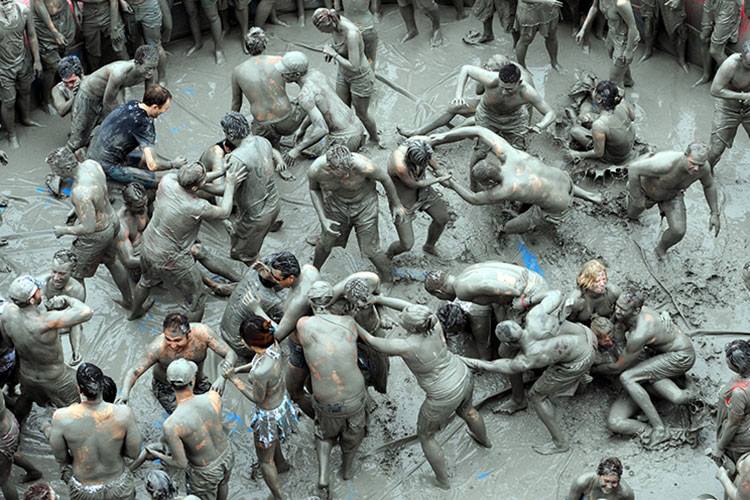
It is believed that the mud flats of Boryeong’s beaches are extremely rich in minerals which are used in the manufacture of cosmetics. In fact, herein lies the reason for the festivals origin-it was actually a marketing initiative launched to educate people about the qualities of Boryeong’s mud.
Now, it has turned into a tourist attraction where, if official figures are to be believed, almost 30 lakh people flock to the beach town and partake in two weeks of fun-filled activities. These include mud massages, mud baths, mud air-bounce, mudfall adventures etc. Imagine a huge mud carnival where millions of people are doing everything possible with the mud, from swimming in it to getting rained on by it.
The Orange Battle In Italy
Celebrated in the Northern Italian city of Ivrea , the Battle of the Oranges is a festival similar to our very own Holi. Instead of colors, people throw oranges on each other. It is also the largest food fight in Italy. Food, it seems, makes for the perfect thing when it comes to slinging matches. Yet another food-throwing festival is celebrated in the picturesque Italian lake-town of Ivrea. This time it’s oranges.
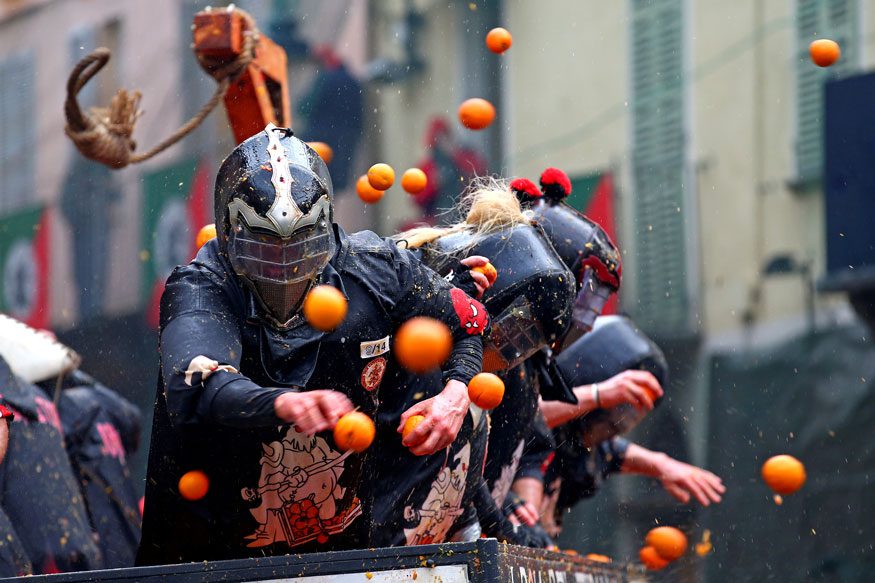
Holi Like Festivals Around The World. Like most events, the roots of this ritual too are steeped in history. Back in the 12th century, the town was ruled by a cruel and oppressive Count who was infamous for forcing himself onto the village’s brides on the night they were married. He did this till, one day, a bride managed to overpower him and cut off his head. The town consequently burst into celebrations and then fought with the ruler’s army to complete their victory.
Since then, each year, the residents of Ivrea divide themselves into nine teams and re-enact the battle by attacking each other with oranges. There are many explanations for why oranges were used, the most popular one being that they signify parts of the male anatomy. The other one being that the people threw stones at the army, so in the later years, as part of the reenactment, oranges were used as they were in abundant supply in the region.
Held in February each year, this orange-slinging match requires 400 tons of the fruit. A girl from the town is chosen to play the part of the miller’s daughter (the bride who beheaded the Count) as are others who play the parts of the soldiers, generals and the like.
After the “battle” everyone joins in the fun turning the streets into rivers of sweet orange juice.
Songkran festival in Thailand
The traditional New Year in Thailand is celebrated from 13 to 15 April every year and this celebration is known as Songkran festival. Closest to our Holi in its concept- Songkran festival is all about throwing water on each other.
Thai New Year, called Songkran, is on April 13 each year and it is celebrated in a way we’re very familiar with-by throwing water at people. Children, especially, love this 3-day festival during which they carry around water-guns (much like our pichkaris) squirting all and sundry. Many also use buckets filled with ice-cold water to douse unsuspecting people-especially the police.
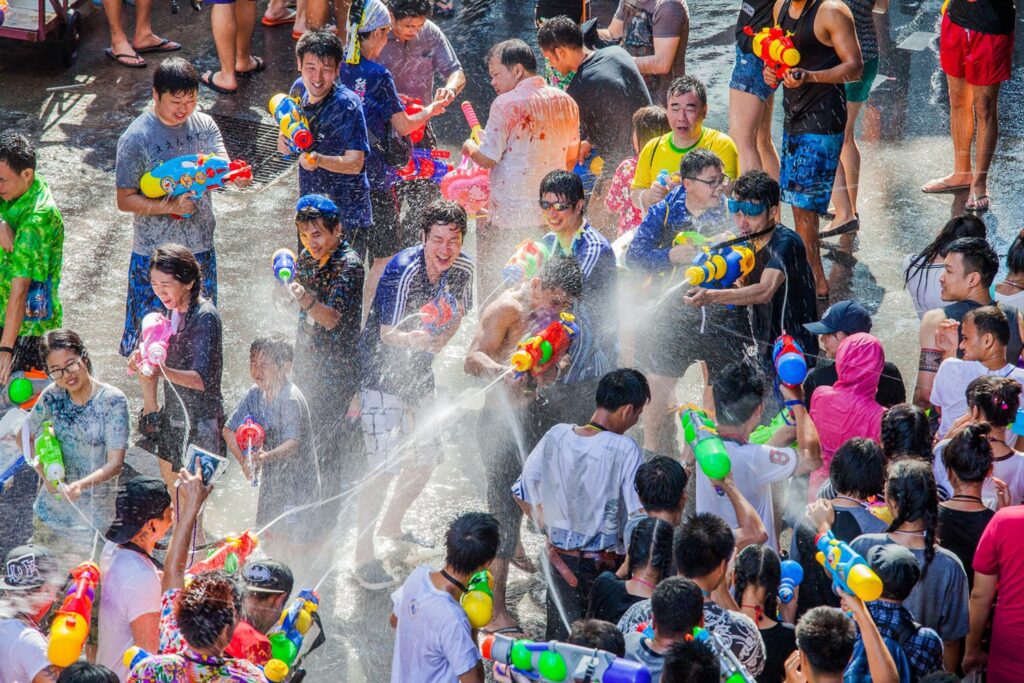
The story about why water is used is because, in the olden days, Songkran was the time when statues of Lord Buddha were brought out to be cleaned with water. This water was collected and sprinkled on by families on each other for prosperity and good luck. As time passed, the sprinkling turned into dousing and then into fun water fights. Understandably, this is now the most loved part of Songkran.
Oktoberfest, Germany
Holi Like Festivals Around The World. The Oktoberfest is a festival held in late September each year in Munich, Bavaria, Germany. It is one of the most famous events in the city and the world’s largest fair, with some six million people attending every year, and is an enjoyable event with an important part of Bavarian culture.
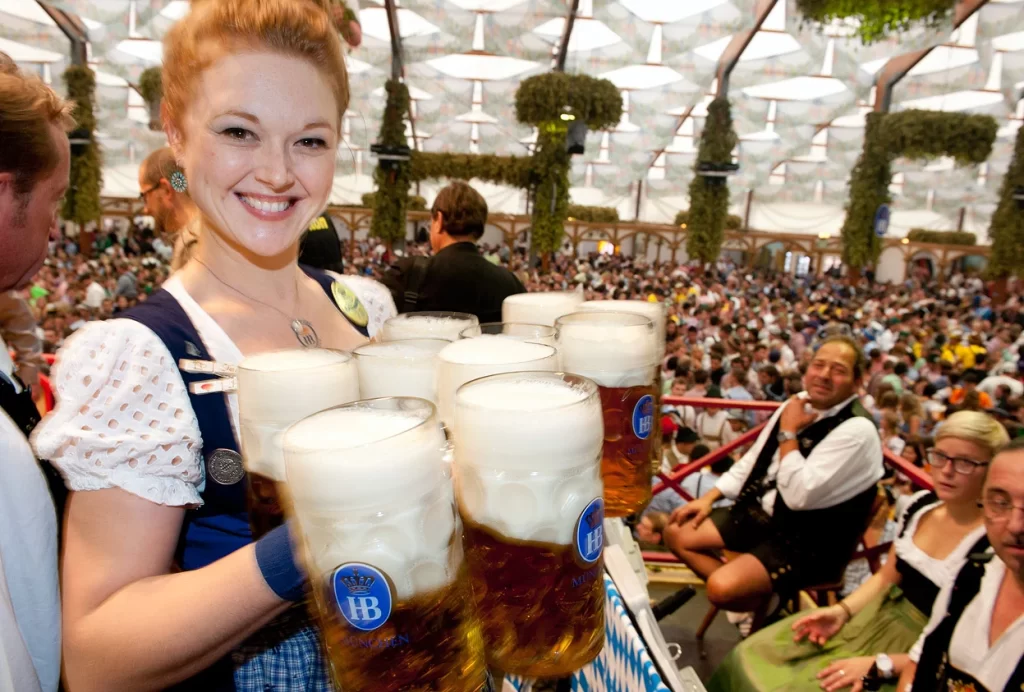
Other cities across the world also hold Oktoberfest celebrations, modeled after the Munich event.Oktoberfestbiers are the beers that have been served at the event in Munich since 1818, and are supplied by 6 breweries known as the Big Six: Spaten, Löwenbräu, Augustiner, Hofbräu, Paulaner and Hacker-Pschorr. Traditionally Oktoberfestbiers were the lagers of around 5.5 to 6% abv called Märzen – brewed in March and allowed to ferment slowly during the summer months. Originally these would have been dark lagers, but from 1872 a strong March brewed version of an amber-red Vienna lager made by Josef Sedlmayr became the favourite Oktoberfestbier.

